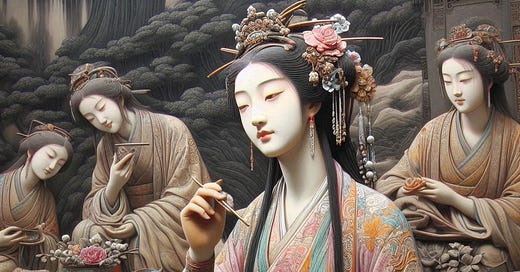Timeless Voices: celebrating the legacy of Chinese female poets
Celebrate the enduring legacy of Chinese female poets Jin Yi, Ye Xiaoluan, and Li Qingzhao, who crafted timeless works and transcended societal boundaries.
Female Voices - Women Writers to Remember
by Alessia Pizzi
N.10 - July 2024
In this edition of "Female Voices”, we explore the lives and legacies of three remarkable female poets from different eras and regions. Their work not only transcended the limitations of their times but also left an indelible mark on the literary world.
3. Li Qingzhao (1084–1155) - A Master of Ci Poetry
Pioneering Female Poet
Li Qingzhao, born during the Song Dynasty, is renowned for her mastery of the Ci poetic form, a genre characterized by its lyrical and emotional style. Her work ranged from personal reflections to political commentary, often exploring themes of love, separation, and patriotism.
Life Amidst Turmoil
Li Qingzhao's poetry often mirrors the turbulence of her life, including the loss of her husband and the turmoil following the Jurchen invasion that displaced the Song Dynasty. Despite her aristocratic background, she faced the hardships of exile and adapted to life as a teacher.
Language and Style
Known for her elegant and evocative use of language, Li Qingzhao's poetry beautifully intertwines natural imagery with human emotions, creating a poignant and resonant literary voice. Her work continues to be celebrated for its emotional depth and stylistic grace.
The wind settles, fallen flowers pile up
Beyond the curtains, pink clusters, heaps of snow.
The memory of blooming honey persists
Now that spring is fading away.
The wine is running out, the songs are ending, the jade cups are emptied
The flame flickers, sometimes dim, sometimes bright.
The soul, even in dreams, cannot bear the anguish
As the cry of longing looms.
Traslated by ChatGPT
2. Ye Xiaoluan (1616–1632) - A Flower That Bloomed Early
A Prodigy in Poetry
Ye Xiaoluan was a young poetess from a cultured family in Wujiang, near Suzhou. Her early education in poetry and music revealed her remarkable talent, evident from her poetic compositions at a very young age. She lived during a time when women's education was gaining traction, particularly among the elite of Jiangnan, and her work is often viewed within the cultural context of the qing movement, which emphasized pure emotion as a source of inspiration.
Early Death and Immortal Legacy
Tragically, Ye Xiaoluan passed away shortly before her seventeenth birthday. Her father, Ye Shaoyuan, preserved her writings, which were later published and celebrated, making her an iconic figure in Chinese female poetry.
Holding the mirror in the fresh morning breeze,
How can I now shape my eyebrows?
Just as I finish placing flowers in my hair,
Outside, the nightingale sings in the willow.
Translated by ChatGPT
3. Jin Yi (1769–1794) - A Shining Star in Late Imperial Chinese Poetry
Brief Life, Lasting Impact
Jin Yi, a talented poetess from Changzhou, China, was born in 1769 and left a lasting legacy despite her brief life. Known for her exceptional poetry, she became a notable figure in a literary world predominantly shaped by male voices. Jin Yi married Chen Ji, a scholar, at twenty, and their home became a hub for cultural exchange. Despite her fragile health, she continued to write and maintain significant literary connections, including with the famous poet Yuan Mei.
Poetry as Autobiography
Jin Yi's poetry is deeply autobiographical, reflecting her personal experiences and emotions. Her work embodies the concept of "shi yan zhi," the expression of one's intent through poetry, allowing her to craft a unique literary identity.
Legacy
Jin Yi's poems were published posthumously, cementing her place in literary history. Her ability to "self-iconize" through her writing allowed her to create a mythic image of herself, a common theme among female poets in a male-dominated literary landscape.
Autumn blows its clear wind,
which blows down the leaves and shakes the trees.
My heart is like a shaken tree,
the fallen leaves scatter the pain.
Translated by DEEPL
These women, despite the societal constraints of their times, used poetry to express their deepest emotions and thoughts. Their contributions to literature not only provided a window into the lives of women in their respective eras but also enriched the cultural heritage of their countries. Their legacies remind us of the enduring power of female voices in literature.
Note: Articles on individual poets are published on my website poetessedonne.it, in the Chinese Poets Category.




